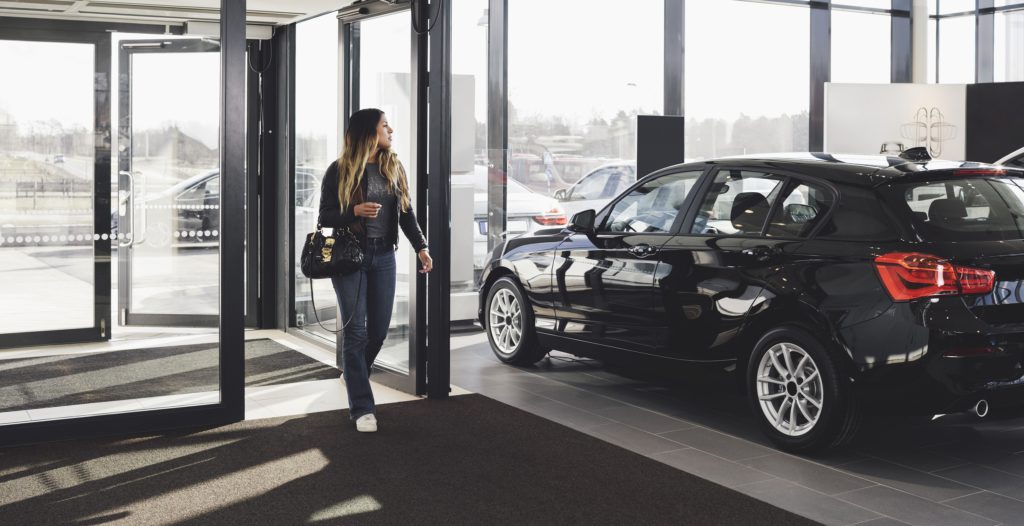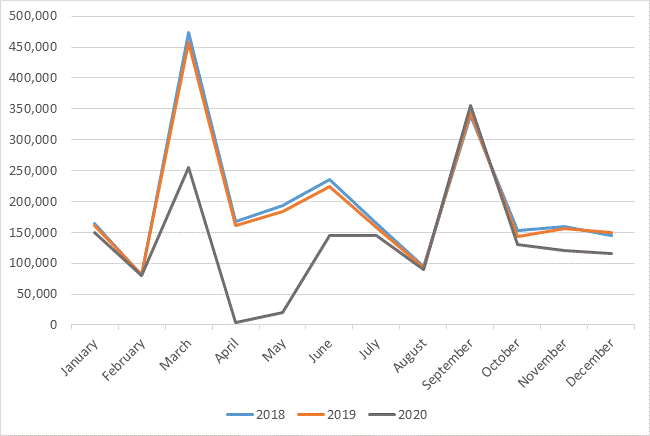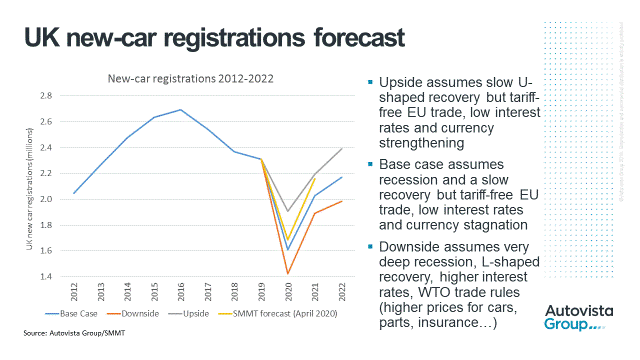Autovista Group holds 2020 UK new-car market forecast with ‘tentative restart’ in June
06 July 2020

6 July 2020
With a staggered reopening of UK dealers in June, the country was one of the last European markets to allow customers back into showrooms. As new-car registrations recovered, compared to previous months, to expected levels, Autovista Group has maintained its 2020 forecast at a decline of 30%. Senior data journalist Neil King discusses the latest developments and outlook.
The update today (6 July) from the UK’s Society of Motor Manufacturers and Traders (SMMT) shows a 35% year-on-year decline in new-car registrations ′as the market began a tentative restart after more than two months of lockdown.’ This was expected as dealers could not reopen until 1 June in England, 8 June in Northern Ireland, 22 June in Wales and 29 June in Scotland, leaving many showrooms out-of-action until late in the month and therefore providing a disjointed picture of sales recovery.
The SMMT reports that ′with one in five showrooms in England remaining shut throughout June, and those in Wales and Scotland unable to open until the end of the month, there remains some uncertainty regarding the true level of demand. The hoped-for release of pent-up sales has not yet occurred, with consumer confidence for big-ticket purchases looking weak, meaning that automotive is likely to lag behind other retail sectors.’
Autovista Group is maintaining its base-case forecast for the UK market, first published in June, of a 30% contraction in UK new-car registrations in 2020. That forecast was a downgrade from the 23% decline forecast in May and 20% forecast in April. In March, before the coronavirus (COVID-19) pandemic took hold, the expectation was that the market would only experience a 3% fall in 2020.
In a downside scenario, disruption to new-car registrations (and supply) is assumed to continue for most of this year, resulting in a loss of some 900,000 registrations and limited opportunity for recovery of the losses later in 2020. The forecast for this worst-case scenario is for UK new-car registrations to fall to 1.42 million units, down 38.5% on 2019.
However, in an upside scenario, disruption to the UK automotive sector will be more short-lived as dealers quickly overcome supply shortages and return to full operational capacity, accompanied by a healthy release of pent-up demand in the coming weeks. A less severe impact on the wider economy would also bolster new-car registrations later in the year. In this scenario, about 400,000 registrations will still be lost but the forecast is for 1.91 million registrations in 2020, down 17.5% on 2019.
UK new-car registrations, January 2018 to December 2020 (forecast from July 2020)
 Source: Autovista Group (forecast from July 2020) and SMMT (historic data to June 2020)
The UK recorded the second-worst performance of the major European markets in June, with only Spain suffering a greater contraction in the month. Although Italy, Spain and Germany also recorded further steep declines, the figures do show promise that markets are recovering. Moreover, France even enjoyed its first year-on-year growth in passenger-car registrations for over six months as new incentives aimed at increasing sales came into effect in the country from 1 June.
Mike Hawes, SMMT chief executive, commented: ′While it’s welcome to see demand rise above the rock-bottom levels we saw during lockdown, this is not a recovery and barely a restart. Many of June’s registrations could be attributed to customers finally being able to collect their pre-pandemic orders, and appetite for significant spending remains questionable.’
′As dealers reopen, I estimate that the UK lost up to 600,000 registrations between March and June 2020. A recovery period is expected to follow, with possible annual growth in new-car registrations in July as the backlog is cleared and pent-up demand is released,’ explained King.
′Buyers may even defer registration of new cars until September, when the new age-related number plates become available. The underlying weakness in demand is expected to result in market contractions in the final quarter and, without government support, my latest forecast estimates 1.61 million registrations in 2020, 30.4% down on 2019,’ King added.
′The government must boost the economy, help customers feel safer in their jobs and in their spending and give businesses the confidence to invest in their fleets. Otherwise it runs the risk of losing billions more in revenue from this critical sector at a time when the public purse needs it more than ever,’ said Hawes.
Source: Autovista Group (forecast from July 2020) and SMMT (historic data to June 2020)
The UK recorded the second-worst performance of the major European markets in June, with only Spain suffering a greater contraction in the month. Although Italy, Spain and Germany also recorded further steep declines, the figures do show promise that markets are recovering. Moreover, France even enjoyed its first year-on-year growth in passenger-car registrations for over six months as new incentives aimed at increasing sales came into effect in the country from 1 June.
Mike Hawes, SMMT chief executive, commented: ′While it’s welcome to see demand rise above the rock-bottom levels we saw during lockdown, this is not a recovery and barely a restart. Many of June’s registrations could be attributed to customers finally being able to collect their pre-pandemic orders, and appetite for significant spending remains questionable.’
′As dealers reopen, I estimate that the UK lost up to 600,000 registrations between March and June 2020. A recovery period is expected to follow, with possible annual growth in new-car registrations in July as the backlog is cleared and pent-up demand is released,’ explained King.
′Buyers may even defer registration of new cars until September, when the new age-related number plates become available. The underlying weakness in demand is expected to result in market contractions in the final quarter and, without government support, my latest forecast estimates 1.61 million registrations in 2020, 30.4% down on 2019,’ King added.
′The government must boost the economy, help customers feel safer in their jobs and in their spending and give businesses the confidence to invest in their fleets. Otherwise it runs the risk of losing billions more in revenue from this critical sector at a time when the public purse needs it more than ever,’ said Hawes.
 Source: Autovista Group/SMMT
The outlook for 2021 is largely dictated by the extent of the losses to registrations incurred in 2020. The higher the loss this year, the higher the pent-up demand to be released next year. This explains why the steepest growth is forecast in the downside scenario and the weakest growth in the upside scenario.
EU trading relationship
Aside from the dramatic effects of the coronavirus crisis, uncertainty still remains surrounding the terms of the UK’s future trading relationship with the EU. Autovista Group’s base-case scenario assumes a deep recession and a slow recovery but ongoing free trade with the EU. In this scenario, the new-car market is forecast to grow 26% and 7% in 2021 and 2022 respectively, returning the market to close to 2.2 million registrations in 2022.
A downside scenario factors in the UK not reaching a trade agreement with the EU, resulting in a very deep recession and L-shaped recovery. The key consequence for the automotive sector is that WTO trade rules would be applied, resulting in higher prices for cars as well as for replacement parts and insurance. In this downside forecast, new-car registrations are forecast to increase by 33% in 2021 but only by 5% in 2022. At just under 2 million registrations, the market would still be 300,000 units lower in 2022 than in 2019.
In an upside ′slow u-shaped recovery’ scenario, the comparatively limited impact of the COVID-19 pandemic in 2020 will be fundamentally recovered in 2021, with registrations growth of 15.0% anticipated. In conjunction with a trade deal that secures ongoing free trade between the UK and the EU, the new-car market is forecast to grow by a further 9% in 2022. At 2.4 million registrations, the UK new-car market would then be at its highest level since 2018.
Source: Autovista Group/SMMT
The outlook for 2021 is largely dictated by the extent of the losses to registrations incurred in 2020. The higher the loss this year, the higher the pent-up demand to be released next year. This explains why the steepest growth is forecast in the downside scenario and the weakest growth in the upside scenario.
EU trading relationship
Aside from the dramatic effects of the coronavirus crisis, uncertainty still remains surrounding the terms of the UK’s future trading relationship with the EU. Autovista Group’s base-case scenario assumes a deep recession and a slow recovery but ongoing free trade with the EU. In this scenario, the new-car market is forecast to grow 26% and 7% in 2021 and 2022 respectively, returning the market to close to 2.2 million registrations in 2022.
A downside scenario factors in the UK not reaching a trade agreement with the EU, resulting in a very deep recession and L-shaped recovery. The key consequence for the automotive sector is that WTO trade rules would be applied, resulting in higher prices for cars as well as for replacement parts and insurance. In this downside forecast, new-car registrations are forecast to increase by 33% in 2021 but only by 5% in 2022. At just under 2 million registrations, the market would still be 300,000 units lower in 2022 than in 2019.
In an upside ′slow u-shaped recovery’ scenario, the comparatively limited impact of the COVID-19 pandemic in 2020 will be fundamentally recovered in 2021, with registrations growth of 15.0% anticipated. In conjunction with a trade deal that secures ongoing free trade between the UK and the EU, the new-car market is forecast to grow by a further 9% in 2022. At 2.4 million registrations, the UK new-car market would then be at its highest level since 2018.
 Source: Autovista Group (forecast from July 2020) and SMMT (historic data to June 2020)
The UK recorded the second-worst performance of the major European markets in June, with only Spain suffering a greater contraction in the month. Although Italy, Spain and Germany also recorded further steep declines, the figures do show promise that markets are recovering. Moreover, France even enjoyed its first year-on-year growth in passenger-car registrations for over six months as new incentives aimed at increasing sales came into effect in the country from 1 June.
Mike Hawes, SMMT chief executive, commented: ′While it’s welcome to see demand rise above the rock-bottom levels we saw during lockdown, this is not a recovery and barely a restart. Many of June’s registrations could be attributed to customers finally being able to collect their pre-pandemic orders, and appetite for significant spending remains questionable.’
′As dealers reopen, I estimate that the UK lost up to 600,000 registrations between March and June 2020. A recovery period is expected to follow, with possible annual growth in new-car registrations in July as the backlog is cleared and pent-up demand is released,’ explained King.
′Buyers may even defer registration of new cars until September, when the new age-related number plates become available. The underlying weakness in demand is expected to result in market contractions in the final quarter and, without government support, my latest forecast estimates 1.61 million registrations in 2020, 30.4% down on 2019,’ King added.
′The government must boost the economy, help customers feel safer in their jobs and in their spending and give businesses the confidence to invest in their fleets. Otherwise it runs the risk of losing billions more in revenue from this critical sector at a time when the public purse needs it more than ever,’ said Hawes.
Source: Autovista Group (forecast from July 2020) and SMMT (historic data to June 2020)
The UK recorded the second-worst performance of the major European markets in June, with only Spain suffering a greater contraction in the month. Although Italy, Spain and Germany also recorded further steep declines, the figures do show promise that markets are recovering. Moreover, France even enjoyed its first year-on-year growth in passenger-car registrations for over six months as new incentives aimed at increasing sales came into effect in the country from 1 June.
Mike Hawes, SMMT chief executive, commented: ′While it’s welcome to see demand rise above the rock-bottom levels we saw during lockdown, this is not a recovery and barely a restart. Many of June’s registrations could be attributed to customers finally being able to collect their pre-pandemic orders, and appetite for significant spending remains questionable.’
′As dealers reopen, I estimate that the UK lost up to 600,000 registrations between March and June 2020. A recovery period is expected to follow, with possible annual growth in new-car registrations in July as the backlog is cleared and pent-up demand is released,’ explained King.
′Buyers may even defer registration of new cars until September, when the new age-related number plates become available. The underlying weakness in demand is expected to result in market contractions in the final quarter and, without government support, my latest forecast estimates 1.61 million registrations in 2020, 30.4% down on 2019,’ King added.
′The government must boost the economy, help customers feel safer in their jobs and in their spending and give businesses the confidence to invest in their fleets. Otherwise it runs the risk of losing billions more in revenue from this critical sector at a time when the public purse needs it more than ever,’ said Hawes.
 Source: Autovista Group/SMMT
The outlook for 2021 is largely dictated by the extent of the losses to registrations incurred in 2020. The higher the loss this year, the higher the pent-up demand to be released next year. This explains why the steepest growth is forecast in the downside scenario and the weakest growth in the upside scenario.
EU trading relationship
Aside from the dramatic effects of the coronavirus crisis, uncertainty still remains surrounding the terms of the UK’s future trading relationship with the EU. Autovista Group’s base-case scenario assumes a deep recession and a slow recovery but ongoing free trade with the EU. In this scenario, the new-car market is forecast to grow 26% and 7% in 2021 and 2022 respectively, returning the market to close to 2.2 million registrations in 2022.
A downside scenario factors in the UK not reaching a trade agreement with the EU, resulting in a very deep recession and L-shaped recovery. The key consequence for the automotive sector is that WTO trade rules would be applied, resulting in higher prices for cars as well as for replacement parts and insurance. In this downside forecast, new-car registrations are forecast to increase by 33% in 2021 but only by 5% in 2022. At just under 2 million registrations, the market would still be 300,000 units lower in 2022 than in 2019.
In an upside ′slow u-shaped recovery’ scenario, the comparatively limited impact of the COVID-19 pandemic in 2020 will be fundamentally recovered in 2021, with registrations growth of 15.0% anticipated. In conjunction with a trade deal that secures ongoing free trade between the UK and the EU, the new-car market is forecast to grow by a further 9% in 2022. At 2.4 million registrations, the UK new-car market would then be at its highest level since 2018.
Source: Autovista Group/SMMT
The outlook for 2021 is largely dictated by the extent of the losses to registrations incurred in 2020. The higher the loss this year, the higher the pent-up demand to be released next year. This explains why the steepest growth is forecast in the downside scenario and the weakest growth in the upside scenario.
EU trading relationship
Aside from the dramatic effects of the coronavirus crisis, uncertainty still remains surrounding the terms of the UK’s future trading relationship with the EU. Autovista Group’s base-case scenario assumes a deep recession and a slow recovery but ongoing free trade with the EU. In this scenario, the new-car market is forecast to grow 26% and 7% in 2021 and 2022 respectively, returning the market to close to 2.2 million registrations in 2022.
A downside scenario factors in the UK not reaching a trade agreement with the EU, resulting in a very deep recession and L-shaped recovery. The key consequence for the automotive sector is that WTO trade rules would be applied, resulting in higher prices for cars as well as for replacement parts and insurance. In this downside forecast, new-car registrations are forecast to increase by 33% in 2021 but only by 5% in 2022. At just under 2 million registrations, the market would still be 300,000 units lower in 2022 than in 2019.
In an upside ′slow u-shaped recovery’ scenario, the comparatively limited impact of the COVID-19 pandemic in 2020 will be fundamentally recovered in 2021, with registrations growth of 15.0% anticipated. In conjunction with a trade deal that secures ongoing free trade between the UK and the EU, the new-car market is forecast to grow by a further 9% in 2022. At 2.4 million registrations, the UK new-car market would then be at its highest level since 2018.